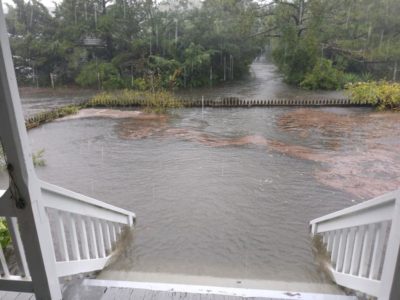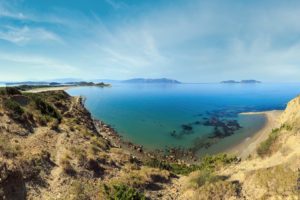Flooding on Ocracoke Island, North Carolina on September 6. Amy Howard via NWS Newport/Morehead
More than 30 percent of U.S. homeowners in Hurricane Dorian’s path dropped their flood insurance policies in recent years, according to an analysis by E&E News. Analysts say this decline could leave tens of thousands of people along the southeastern coast in dire financial positions following the storm; regular homeowner’s insurance does not cover flood damage.
Hurricane Dorian dropped heavy precipitation on parts of Florida and Georgia earlier this week, and is now expected to cause major flooding in North and South Carolina. E&E News examined government data on federal flood insurance policies in the 59 counties that issued evacuation orders related to Dorian. In September 2011, homeowners in those counties held a total of 734,445 federal policies. As of this week, just 508,731 policies were in effect — a 31 percent decline.
Some homeowners may have switched to private flood insurance, but the vast majority of flood policies in the United States are issued by the federal government. The drop seen along the southeastern coast is representative of a larger, nationwide decline in flood insurance in recent years, driven by rising premiums that contain fewer discounts and more accurately reflect flood risk.
Without a flood policy, homeowners impacted by Dorian will need to pay for repairs either out of pocket, by filing for limited taxpayer-funded federal disaster relief, or by getting a low-interest disaster loan from the Small Business Administration.
“A lot of the time what you’ll see is a big spike after a big flood event as people realize flood insurance could be a good investment,” Anna Weber, a senior policy analyst and flood insurance expert at the Natural Resources Defense Council, told E&E News. “Over the next few years it sort of tails down. There is a certain amount of flood amnesia that happens in communities where a flood doesn’t happen for awhile and you want to put your money toward other things.”



